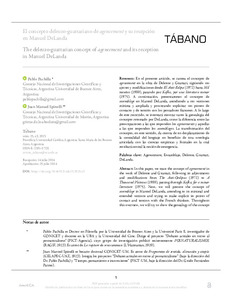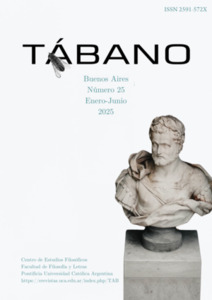Por favor, use este identificador para citar o enlazar este ítem:
https://repositorio.uca.edu.ar/handle/123456789/19424| Título: | El concepto deleuzo-guattariano de agencement y su recepción en Manuel DeLanda The deleuzo-guattarian concept of agencement and its reception in Manuel DeLanda |
Autor: | Pachilla, Pablo Spinelli, Juan Manuel |
Palabras clave: | FILOSOFIA DE LA CIENCIA; ONTOLOGIA; Deleuze, Gilles, 1925-1995; Guattari, Félix, 1930-1992 | Fecha de publicación: | 2025 | Editorial: | Pontificia Universidad Católica Argentina. Facultad de Filosofía y Letras. Centro de Estudiantes de Filosofía | Resumen: | En el presente artículo, se rastrea el concepto de agencement en la obra de Deleuze y Guattari, siguiendo sus ajustes y modificaciones desde El Anti-Edipo (1972) hasta Mil mesetas (1980), pasando por Kafka, por una literatura menor (1975). A continuación, presentaremos el concepto de assemblage en Manuel DeLanda, atendiendo a sus versiones mínima y ampliada y procurando explicitar sus puntos de contacto y de tensión con los pensadores franceses. A lo largo de este recorrido, se intentará mostrar tanto la genealogía del concepto retomado por DeLanda, como la diferencia entre las preocupaciones a las que responden los agencements y aquellas a las que responden los assemblages. La transformación del concepto, en este sentido, da cuenta de un desplazamiento de la centralidad del lenguaje en beneficio de una ontología articulada con las ciencias empíricas y formales en la cual resultará central la noción de emergencia. In this paper, we trace the concept of agencement in the work of Deleuze and Guattari, following its adjustments and modifications from The Anti-Oedipus (1972) to A Thousand Plateaus (1980), passing through Kafka, for a minor literature (1975). Next, we will present the concept of assemblage in Manuel DeLanda, attending to its minimal and extended versions and trying to make explicit its points of contact and tension with the French thinkers. Throughout this overview, we will try to show the genealogy of the concept taken up by DeLanda, as well as the difference between the concerns to which agencements respond and those to which assemblages respond. The transformation of the concept, in this sense, shows a displacement of the centrality of language in favor of an ontology articulated with the empirical and formal sciences, in which the notion of emergence will be central. |
URI: | https://repositorio.uca.edu.ar/handle/123456789/19424 | ISSN: | 2591-572X | DOI: | 10.46553/tab.25.2025.e3 | Derechos: | Atribución-NoComercial-CompartirIgual 4.0 Internacional | Fuente: | Tábano. 2025, 25 |
| Aparece en las colecciones: | TAB - 2025 nro. 25 |
Ficheros en este ítem:
| Fichero | Descripción | Tamaño | Formato | |
|---|---|---|---|---|
| concepto-deleuzo-guattariano.pdf | 817,19 kB | Adobe PDF |  Visualizar/Abrir | |
| gilles-deleuze-años.png | 86,34 kB | image/png |  Visualizar/Abrir |
Este ítem está sujeto a una Licencia Creative Commons

